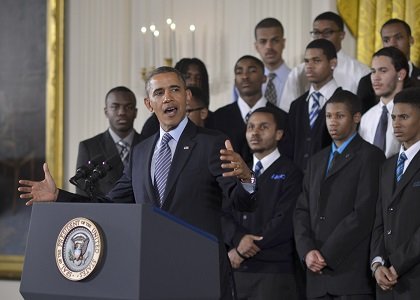WASHINGTON (NNPA) — More than 200 African American men, ranging from a taxi driver to university professors, sent a letter to President Obama on Tuesday urging him to expand his Black male initiative to include Black girls and women, saying they were “surprised and disappointed” that the president had sought to include only half of the race to tackle community-wide issues.
A copy of the letter to Obama was obtained by the NNPA News Service.
After praising the president for saying that addressing the needs of those left behind is as important as anything else he is undertaking, authors of the letter wrote, “So we were surprised and disappointed that your commitments express empathy to only half of our community – men and boys of color. Simply put, as Black men we cannot afford to turn away from the very sense of a shared fate that has been vital to our quest for racial equality across the course of American history.”
The letter continued, “As African Americans, and as a nation, we have to be as concerned about the experiences of single Black women who raise their kids on sub-poverty wages as we are about the disproportionate number of Black men who are incarcerated. We must care as much about Black women who are the victims of gender violence as we do about Black boys caught up in the drug trade.”
The 893-word letter maintained a respectful, dignified tone throughout, but was consistently firm in asserting that President Obama had erred in limiting his initiative to Black males.
“We write as African American men who have supported your presidency, stood behind you when the inevitable racist challenges to your authority have emerged, and have understood that our hopes would be tempered by the political realities that you would encounter,” the letter stated. “While we continue to support your presidency, we write both out of a sense of mutual respect and personal responsibility to address what we believe to be the unfortunate missteps in the My Brothers Keeper initiative (MBK). In short, in lifting up only the challenges that face males of color, MBK – in the absence of any comparable initiative for females – forces us to ask where the complex lives of Black women and Black girls fit into the White House’s vision of racial justice?”
On Feb. 27, President Obama announced his “My Brother’s Keeper Initiative, a program to assist young Black males. With the parents of slain Florida teenagers Trayvon Martin and Jordan Davis looking on, Obama said: “After months of conversation with a wide range of people, we’ve pulled together private philanthropies and businesses, mayors, state and local leaders, faith leaders, nonprofits, all who are committed to creating more pathways to success. And we’re committed to building on what works. And we call it ‘My Brother’s Keeper.’”
Among those signing the letter to Obama were Luke C. Harris, associate professor of American politics and constitutional law at Vassar College; Robin D.G. Kelly, professor of history at UCLA; Michael Hanchard, professor of political science at Johns Hopkins University; James Turner, founder of the Africana Studies and Research Center at Cornell University; Robert Hill, professor of history and editor-in-chief of the Marcus Garvey and Universal Negro Improvement Association Papers Project at UCLA; Houston Baker, professor of English at Vanderbilt University; Charles Steele, president and CEO of the Southern Christian Leadership Conference (SCLC); poet Saeed Jones; David Melton, a taxicab driver; writer Robert Jones, Jr.; psychiatrist Adisa Ajamu; filmmaker Byron Hurt; and former NFL player Wade Davis Jr., executive director of the You Can Play Project, an organization dedicated to ending discrimination and homophobia in sports.
“Everyone is focused on getting nearly 300 girls safely returned home in Nigeria and rightly so,” said Steele, president of the Atlanta-based civil rights organization co-founded by Dr. Martin Luther King, Jr. “We should stay focused on the 300 girls in Nigeria, but at the same time not forget about the millions of Black girls and women suffering right here at home.”
Professor Harris said the men’s activities will not cease with sending the letter to Obama. He and several others will write a series of articles for the National Newspaper Publishers Association News Service and BlackPressUSA.com, NNPA’s companion website, beginning next week. They will host a webinar in June and continue to educate the public about the issues raised in the letter.
Meanwhile, the group will continue to collect signatures [ blackgirls2014@gmail.com] and provide updates on future activities at the African American Policy Forum’s website, www.aapf.org. Organizers said more than 200 men had signed the letter by Tuesday.
The letter to Obama stated, “We are not suggesting a national moratorium on Black male-oriented projects. But our sense of accountability does reflect the fact that our historic struggle for racial justice has always included men as well as women who have risked everything not just for themselves or for their own gender but for the prospects of the entire community.”
